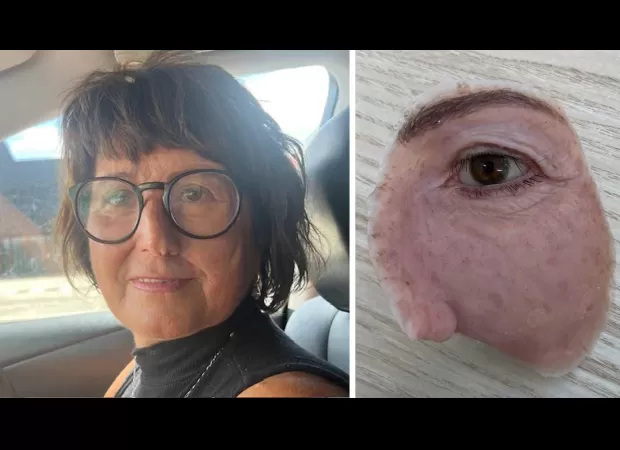Tracey had her eye removed due to cancer, but her artificial replacement was deemed only for appearance.
Construction manager in Queensland, Tracey Sims, was surprised to learn that her fake eye was not covered by Medicare or insurance.

Tracey Sims, a construction manager from Queensland, is a true survivor. Over the past six years, she has been through some tough times that have tested her strength and resilience. It all started back in 2018, when Tracey noticed that her eye was constantly watering. She went to the doctor, who told her it was just a blocked tear duct. Little did she know, this was just the beginning of her journey.
During a minor operation to fix the blocked duct, the surgeon discovered something unexpected - a tumor. Tracey was diagnosed with skin cancer, specifically squamous cell carcinoma, and underwent radiation treatment. After three years, she received the devastating news that the cancer had returned. Tracey's mind immediately went to the worst-case scenario - she thought the cancer had spread throughout her body and she wouldn't be around for much longer.
"I was thinking, 'This is it, the cancer has taken over,'" Tracey recalls. "I couldn't believe it. I have kids, they're going to get married and have kids. But now I won't be here in six months."
The reality was even more shocking - Tracey was told that her eye would need to be removed. But surprisingly, this news brought her a sense of relief. "To me, it was like, 'Okay, you're taking my eye. That's fine. I can deal with that,'" she explains.
Tracey underwent surgery to remove her eye, eye socket, and part of her cheekbone. She also received chemotherapy and radiation treatment. Despite all of this, Tracey was determined to continue living her life and even returned to work. For the next six or seven months, she covered her face with a large band-aid while searching for a solution to her missing eye.
"I was constantly calling the plastic surgeon, asking for advice," Tracey shares. "I couldn't walk around with this gaping hole in my head, it was an open wound. Anyone could look and see inside my head."
Thankfully, Tracey was connected with an anaplastologist named Sophie Fleming, who specializes in making facial prosthetics. Sophie fitted Tracey with a custom-made prosthetic eye made of silicone, molded to fit her facial cavity perfectly. Tracey was ecstatic with the result and felt a newfound confidence to go out into the world.
"I wasn't afraid to go out with a few band-aids on my face, but having the prosthetic eye just gave me that extra boost of confidence," she says. "I know I'm protecting myself as best as I can."
However, the prosthetic eye came at a steep cost of $6500, which was not covered by Medicare or Tracey's private health insurance. This was a shock to her, as she believed it was a necessary part of her treatment and not an optional cosmetic procedure.
"It's crazy to think that this is not covered, especially when it's a result of cancer treatment," Tracey says. "There are people who can't afford it, and I was lucky to have some savings to cover the cost."
To make matters worse, Tracey's life insurance company also denied her claim for permanent disability because she still had one eye. This was a harsh reality for Tracey, who couldn't believe that this was the response she received after going through so much.
Tracey's story is not unique - there are many other cancer survivors who are also facing financial barriers when it comes to getting facial prosthetics or dental implants. In fact, a recent Senate inquiry found that these services are not covered by Medicare, leaving many patients with limited options.
Nadia Rosin, the CEO of Head and Neck Cancer Australia, explains the impact of this issue on cancer survivors. "We've heard stories of people not leaving their house, avoiding their grandchildren, or using tape to cover their face when they go out," she says.
Sophie Fleming also shares her thoughts on the matter, stating that this barrier adds unnecessary distress to the already difficult treatment process. "It's heartbreaking to see these patients go through surgery to remove a part of their face, only to then struggle with the idea of having to fund their own reconstruction because it's considered a prosthetic," she says.
Thankfully, there is hope for change. One of the recommendations from the Senate inquiry's final report is for the Australian Government to work with state and territory governments to identify and address the barriers faced by cancer patients in need of rehabilitation, prosthetics, and implants after treatment.
Senator Wendy Askew, who sat on the inquiry's committee, emphasizes the importance of access to these services for cancer survivors. "Having access to dental implants and facial prosthetics is a vital step in a patient's journey to recovery," she says. "It restores their dignity and helps to reverse the disfigurement they have endured during their treatment."
For Nadia Rosin, this recommendation is a chance to transform the lives of cancer survivors in Australia. "We need to allow these people to not just survive, but to enjoy life and be a part of society in a normal way," she says.
Head and Neck Cancer Australia is currently working on a funding proposal with expert clinicians to present to Health Minister Mark Butler. This is an important step in addressing the inequity faced by cancer patients in need of these services. 9news.com.au has reached out to the Department of Health for comment on this issue.






